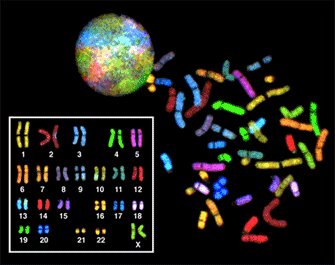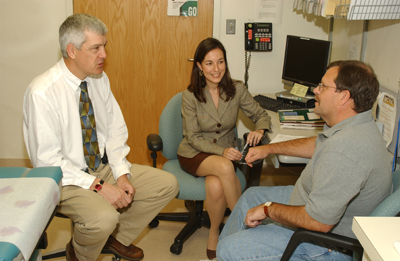« Prev Next »

A much-anticipated outcome of these technological advances is that new, more accurate diagnostics have rapidly become available (Figure 1). Health care professionals must therefore keep up with recommendations for treatments and interventions that are being researched and tailored to diagnostic results. Additionally, as genetic knowledge and technologies become more mainstream, patients are increasingly asking their health care providers about genetic tests and disease risks. As a consequence, the National Coalition for Health Professional Education in Genetics is committed to educating health care providers about current genetic and genomic research.
The establishment of and need for such an organization is indicative of the growing responsibilities of all health care providers during the ongoing revolution in genomic health care. The duties of genetic health care professionals have evolved to meet the demands for generating new genetic knowledge, accurately disseminating this knowledge to the public, and generating and interpreting genetic results. Such professionals include clinical geneticists, clinical laboratory geneticists, research scientists, genetic counselors, and genetic nurses. There is a specialist involved in each step of the process of making genetic discoveries in the laboratory and then bringing them to the general public.
Clinical Geneticist and Clinical Laboratory Geneticist
The clinical geneticist is a clinician who makes a diagnosis based on clinical examination of the patient along with various test results that aid in confirming the diagnosis. In cases of inherited disorders, the clinical geneticist not only must recognize the need for and value of genetic testing, but he or she is also responsible for properly interpreting the results and making treatment or management recommendations. Types of genetic testing that are available include carrier testing for autosomal recessive and X-linked disorders, molecular or cytogenetic diagnostic testing, pharmacogenomic testing to determine how a patient might respond to a type or class of drug, and susceptibility or predictive testing, such as BRCA1 and BRCA2 testing to determine risk of breast cancer (See Table 1).
Table 1. Types and Uses of Genetic Tests
| Type of Test | Examples of Genetic Disorders Detected | Possible Reasons for Choosing Test |
| Carrier testing | Cystic fibrosis, Tay-Sachs disease | This type of test is often used by individuals with a family history of a specific disorder who wish to determine their risk for having a child affected with that disorder. |
| Prenatal diagnosis | Down syndrome | This type of test is generally used after an ultrasound detects an abnormality in a fetus and the mother desires a specific genetic diagnosis. |
| Newborn screening | Phenylketonuria; congenital hypothyroidism | A number of such tests are required in the United States, and some states test for dozens of disorders. These tests are generally performed on a blood sample collected immediately after birth. |
| Testing for late-onset disorders | Cancer, Huntington's disease | Genetic testing for some disorders, like certain types of cancer, may allude to a predisposition to disease under specific environmental conditions (e.g., smoking). Other disorders, like Huntington's disease, have a clear genetic cause but only manifest later in life and can be tested for at any time. |
| Pharmacogenomic testing | Cytochrome P450 | Patients requiring specific medicines, like warfarin, might undergo a genetic test to determine the likely rate of drug metabolism, thus providing the doctor with critical information for proper dosage. |
| Identification | Genetic profile or DNA fingerprint | Genetic testing may assist in identifying an individual, as in paternity cases or law enforcement situations. |
Research Scientist
The research scientist is another genetic health care professional. After college, an individual interested in primary genetic research would typically enter a Ph.D. program in genetics. After completing advanced courses in genetics and related specialties, students carry out original research under the direction of a faculty member. Most graduates of such programs conduct research as postdoctoral fellows for two to four years, continuing to carry out original research on a topic of primary interest to them and publishing results in peer-reviewed journals. Individuals would then be qualified to assume faculty positions at academic institutions or join the staffs of research institutes or biotechnology and pharmaceutical firms.
Genetic Counselor

There are numerous medical, psychological, and familial implications for individuals faced with a disease or a condition that has a genetic contribution. A genetic counselor is a board-certified professional with an M.S. who is trained to guide the individual or family through the process of understanding and adapting to a diagnosis. As part of this process, the genetic counselor will interpret family and medical histories to assess and calculate the chance of disease occurrence or recurrence and will educate the patient about inheritance. Genetic counselors are knowledgeable about current research, available testing, and how to interpret results of genetic testing. They can help with management of or adaptation to a condition, prevention of symptoms or recurrence, and obtaining resources for further information and support. Most importantly, the genetic counselor facilitates the decision-making process for a patient in a way that is nondirective and patient-centered. That is, genetic counselors empower their patients with information while encouraging them to evaluate personal psychosocial values, so that patients can make the decision that is best for them. The decision to undergo genetic testing involves important medical, legal, ethical, and social implications, and the genetic counselor assists patients in this decision.
Genetic Nurse
Nurses with master's or bachelor degrees can become credentialed in genetics through the Genetic Nursing Credentialing Commission (GNCC). The nursing industry believes that changes to health care due to genomic advancements will, in turn, change the practice of nursing. Nurses will be called upon to aid their patients in changing lifestyle behaviors for better health, managing the effects of chronic illness to improve health and quality of life, identifying effective strategies to reduce health disparities, harnessing advanced technologies to serve human needs, and enhancing the end-of-life experience for patients and their families (Conley & Tinkle, 2007). Because of a dearth of genetic counselors (approximately 2,000 counselors have been certified through 2008) and clinical geneticists (approximately 1,200 certifications had been awarded through 2007), nurses will likely be taking on more of the responsibilities of genetic health care services and research studies (American Board of Medical Genetics, 2008).
References and Recommended Reading
American Board of Medical Genetics. "Numbers of Certified Specialists in Genetics - By Specialty."
Conley, Y. P., & Tinkle, M. B. The future of genomic nursing research. Journal of Nursing Scholarship 39, 17–24 (2007)





























